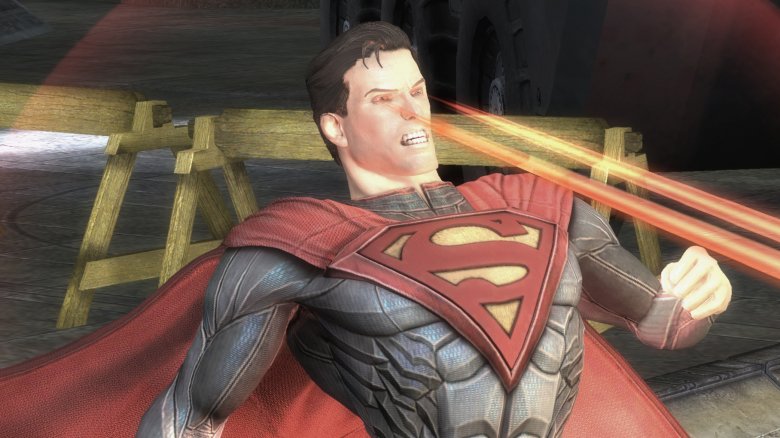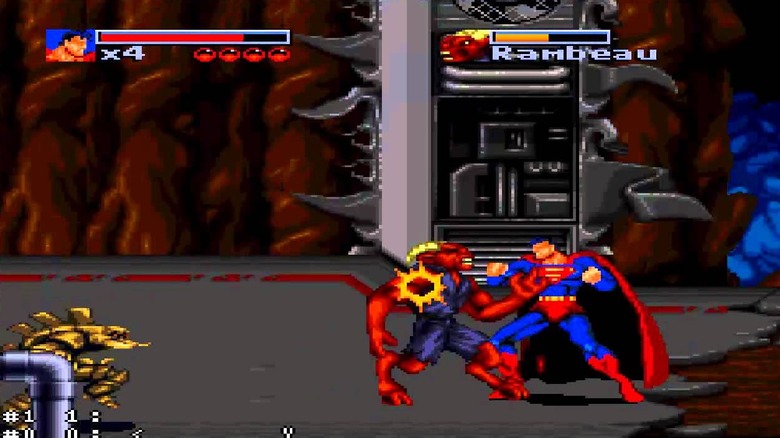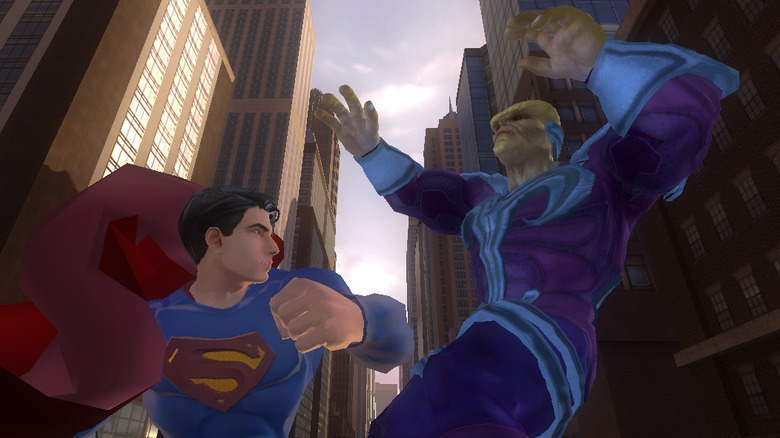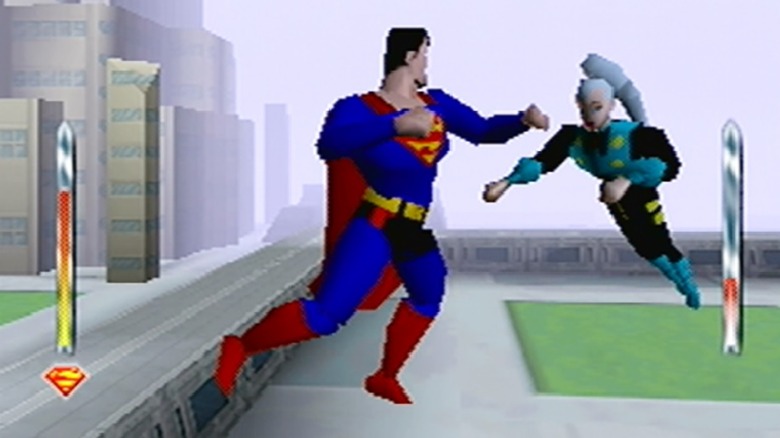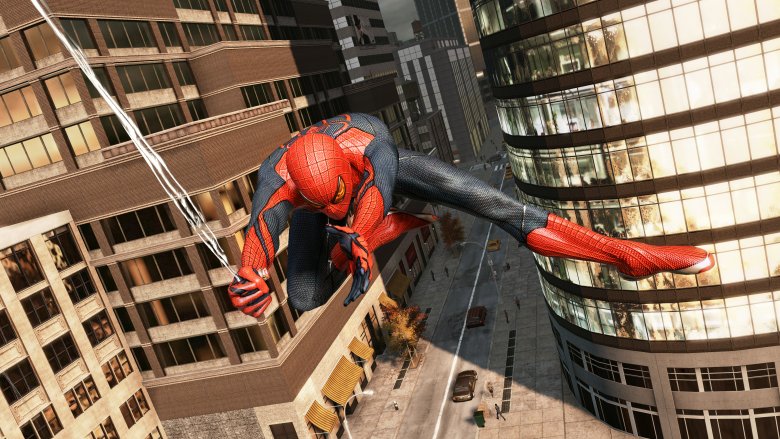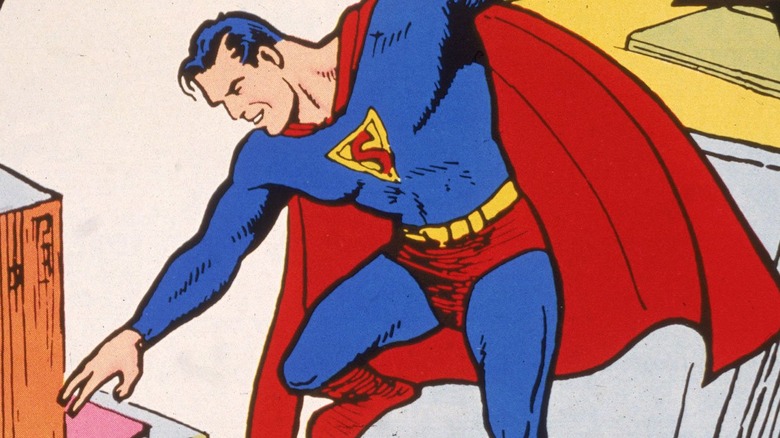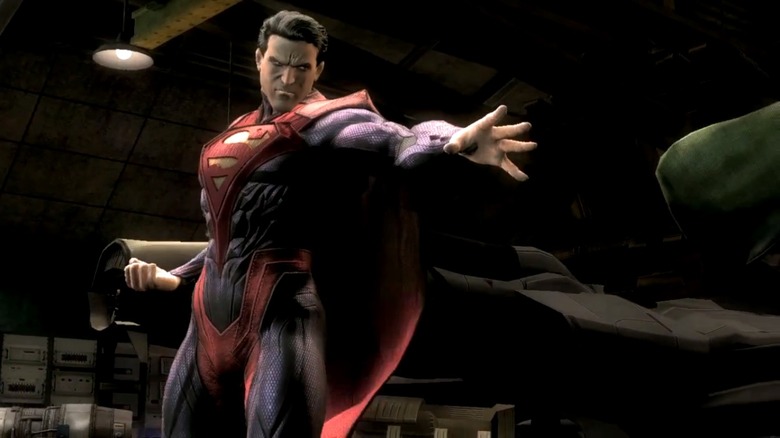The Real Reasons Superman Will Never Have A Good Game
For being one of the world's most popular superheroes, and one you definitely want on your side in a bar fight, it's shocking how badly Superman fares in the video game world. Despite decades of attempts, building a truly good game around the Man of Steel has proven a more difficult feat than pronouncing "Mxyzptlk" without help. But why is that? What is it about Clark Kent that makes quality gaming his Kryptonite? Let's investigate.
He's invincible, and that's boring
With most video games, there are stakes. You wander around, fight bad guys, and if you take enough damage, you're defeated. Most Superman games do that too, and there lies the problem. Superman, more than any other superhero, simply doesn't take damage. Unless exposed to Kryptonite, he's nearly invincible, which doesn't translate to a fun, challenging game experience.
Game developers know this, so in most every Superman game, he suddenly has a health bar. Get hit enough, and you either die or lose your powers. In short, the most powerful hero ever becomes just another guy walking around in blue pajamas. And it's not just Kryptonite that can harm him: it's basically anything. Would you find a game appealing where Kal-El, the immortal alien with god-like powers, gets sent to an early grave by a common street thug punching him too much? If you said yes, quit lying.
For an authentic Superman experience, he would have to be impossible to hurt or kill, unless the bad guy's wielding a glowing green rock. In addition, a truly authentic Superman game would sport dozens of superpowers, all of which can be used at virtually any time. There would be no real limits, aside from Superman's own conscience, which doesn't often come into play when fighting the forces of evil. God Mode's a fun cheat in otherwise-challenging games, but when the entire thing is God Mode, few are going to even bother.
His rogues' gallery is surprisingly unmemorable
Part of the reason most Batman games have been so well-received over the years is the Dark Knight's villains are unquestionably legendary. Even casual Bat-heads know of the Joker, Penguin, Catwoman, and the Riddler, just to name a few. Superman's enemies, on the other hand, just aren't as memorable, which means the games starring them aren't memorable either.
Obviously, everyone knows of Lex Luthor, Supes' arch-enemy. Most casual fans have heard of Doomsday — thanks to the "Death of Superman" comic arc where Superman didn't die — and General Zod. Outside of that, however, you need to be pretty into the Superman mythos to recognize and appreciate his rogues' gallery. Names like Brainiac, Bizarro, Atomic Skull, or Toyman simply won't resonate with gamers the way other baddies do. And if gamers outside of hardcore Superman fandom don't know who these bad guys are, why should they have any reason to plunk down $60 to fight them?
A game full of obscure villains could work, but a lot of effort would need to go into the storyline. The writers would need to spend extra time introducing these characters, along with their motivations and your reason for fighting them. It's not enough to tell the typical gamer, "Here's Gog, go punch him" the way you could tell them to punch Two-Face or Mister Freeze.
The last few Superman games were super-terrible
No franchise bats a thousand; the more games a popular character gets, the more likely a few of them will be clunkers. (Isn't that right, Batman Beyond: Return of the Joker?) That said, Superman-centered games have an especially terrible batting average, with two of them so irrevocably putrid, they may have tainted Superman's video game name for good.
In 1999, Superman celebrated 20 years of bad games by starring in Superman: The New Adventures, though it's better known as Superman 64, one of the most infamously awful games in history. Despite a semi-decent attempt to get around the whole invincibility thing (by trapping Superman in a virtual-reality world laced with Kryptonite fog) its boring, repetitive gameplay, combined with ugly graphics and a lack of backgrounds, scream "incomplete game," making for a traumatic gaming experience few fans have recovered from to this day.
Then, in 2006, came Superman Returns, an open-world game loosely based on the Brandon Routh-starring movie. This was the rare game where Superman was actually invincible; you lost if you caused or allowed too much destruction to come to Metropolis. That all sounds great, but the game itself was terrible, featuring substandard graphics, awful controls, repetitive gameplay, and a main quest that featured a tornado as the final boss. It wasn't even a sharknado, just a regular tornado. Over ten years later, Superman has not starred in another video game. Apparently, you only get two super-strikeouts before you're ejected from the video game ballpark.
Superman's ground-game is almost always dull
To get around, Superman can fly or he can walk. And whenever a game puts him on the ground and makes him walk, its entertainment value drops significantly. To put it simply, a walking Superman is a boring one.
Superman's most known for his flying, so playing through any game where he both walks and flies (such as Superman on the Sega Genesis, embedded above) shows a clear discrepancy between the two. The ground sections are basic, boring side-scrolling stages, while the flying areas are more fun, more action-packed, and freer than their land-loving counterparts. But rare is the super-game that lets you fly exclusively, meaning a good chunk of each game is a slog. Superman Returns is mostly flight-based, to be fair, but since that whole game is a slog, it's hard to give it much credit at all.
His games don't have a hook beyond starring a superhero
If you think the only thing your superhero game needs is an overpowered super-person beating people up, your game's gonna flop, and you're gonna have a bad time.
Many good, enjoyable superhero games have an extra hook that make then more than just "superhero games." Batman's Arkham series lets you beat up bad guys, but also showcases the character's other dimensions: he's the World's Greatest Detective, and he embodies The Night. You look for clues, inspect your surroundings, and rather than punching a dozen no-goodniks at once, you typically hide in the shadows and attack only when opportune. Then there's Deadpool: mostly a straight-ahead superhero beat-em-up, but so overloaded with hilarious, inappropriate, and hilariously inappropriate jokes, you barely even notice. Then there are the recent Spider-Man games, where you can free-roam New York City and swing from building to building, as the Wall Crawler does. They're so authentically Spidey, you even deliver pizzas in one, presumably for sub-minimum wage.
Superman's games, meanwhile, simply haven't found that hook, and simply "being Superman" clearly isn't enough. Perhaps revisiting (and vastly improving on) Superman Returns' premise — a free-roaming adventure where your success is based on how much you can save, rather than simply beating up Luthor and his cronies — is the answer. But it remains to be seen if anyone is willing to take on that challenge.
Early Superman might work, but good luck selling it
Interestingly enough, the solution to making Superman video games work might be to pretend anything after 1940 never happened.
When Superman debuted in 1938, he was very different from the Man of Steel we know, love, and CGI mustaches off of today. Golden Age Superman could run faster than a speeding train, but wasn't breaking the sound barrier or reversing the Earth's rotation. He couldn't fly, but instead jumped 20 stories high, and 1/8 of a mile in length. He was super-strong, lifting many times his body weight, but couldn't move mountains or anything. Plus, as Action Comics #1 tells it, "nothing less than a bursting shell could penetrate his skin" — a simple pistol shot couldn't harm him, but he wasn't invulnerable either. Finally, he had no extra powers: no X-ray vision, no heat vision, no super-hearing, and definitely no super-math.
OG Supes had limits, and it's those limits that might finally make it fun to play a Superman game. The problem would be selling it, since you'd have to convince modern gamers to ignore almost everything about a character they've known their entire lives, and embrace a prototype whose own creators likened him to ants and grasshoppers. It would appeal to a niche audience at best, and that's simply not good enough for game companies obsessed with the bottom line. Then again, people love Cuphead, a game where you play through creepy '30s-style cartoons, so maybe there's hope for old Supes to become new again, after all.
Superman works best when paired with others
While Superman's solo jaunts haven't exactly lit the world on fire, in recent years he did manage to appear in a couple great games: Injustice: Gods Among Us and its sequel, Injustice 2. In a dramatic shift from his Big Blue Boy Scout image, Injustice's Superman is an evil tyrant who killed Joker in a fit of rage, then ruled the world through fear and violence. Yet, despite this not being a typical Superman story, and despite Injustice being a fighting game rather than an adventure, Injustice has proven incredibly popular, which makes us think the problem isn't Superman as a game character: it's Superman as the only game character.
In a game like Injustice, Superman gets to bounce off of other characters, both heroic and evil, and display his personality beyond "heroic do-gooder." So perhaps a Justice League action-RPG, while not his game, would do wonders for a more traditional, less brutally cruel Superman. Being around his people — Batman, Flash, Wonder Woman, and the like — might just make Superman relatable enough to make people want to play as him again.
There have been several Justice games in recent years, but most have been sub-par fighting games that don't deserve mention here. Also, there's the Lego Batman series, which are great fun but also feature Daffy Duck as a Green Lantern. You can only take a game like that so seriously.

